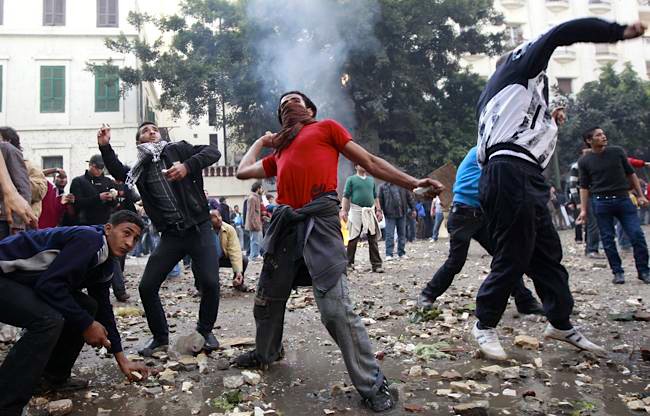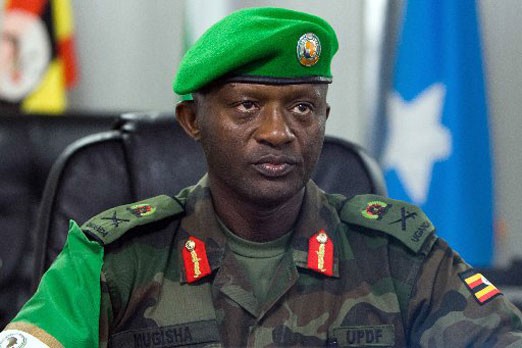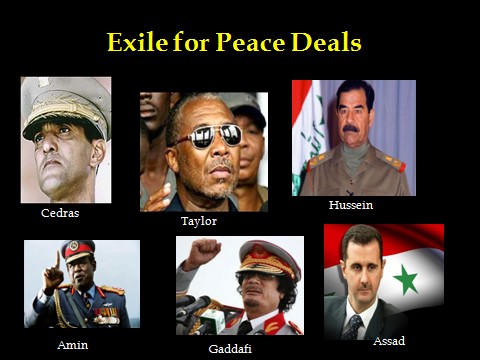
- •The 1949 Geneva Conventions
- •The Torture Convention
- •4. General Human Rights Conventions
- •Customary International Law
- •Jus Cogens
- •Amnesty/Exile and the International Criminal Court
- •The Preamble
- •Article 16: Action by the Security Council
- •Article 53: Prosecutorial Discretion
- •Article 17: Complementarity

INT R OD UC T I ON T O
INT E R NA T I ONA L
CRI M I N AL LAW
MOOC taught by Professor Michael P. Scharf
 Module
#2:
Peace
verses
Justice
Module
#2:
Peace
verses
Justice
War Crimes, Crimes Against Humanity and Genocide
 International
Criminal
Law
Module
#2
International
Criminal
Law
Module
#2
Peace verses Justice
Read the article below, and then consider the following fictional case: The Case of Togoland
The African country of Togoland has a population of four million people, comprised of two main ethnic groups, the Tumani (45 percent of the population) and the Hottami (55 percent of the population). Its main export is the rare mineral cobalt, which is mined throughout the country. From March 2008 through May 2013, Togoland was ruled by a democratically elected President, George Humbarty, who was a member of the minority Tumani tribe.
During his last few months in office, Humbarty was under investigation on charges of embezzlement of government funds by the Togoland Peoples’ Congress. On May 1, 2013, President Humbarty died of a heart attack while in bed with his mistress. Humbarty’s Vice President, Jean Erickson (also a member of the Tumani tribe), was attending a meeting of the UN Human Rights Commission in Geneva at the time. Under the Togoland Constitution, the Vice President is to automatically assume the Presidency upon the death of the President.
A few hours after Humbarty died, a military faction seized power in a bloodless coup. The military regime is led by General Thomas Cederick (a member of the majority Hottami tribe), who was the former Chief of Staff of the army in the Humbarty Administration. General Cederick has vowed to turn the government back over to a democratically elected President after he has cleansed the Executive Branch of corrupt officials.
General Cederick’s subordinates immediately rounded up the members of the Humbarty Administration and subjected them to extraordinary interrogation methods, including “water boarding,” in order to induce them to confess to their acts of corruption. General Cederick then convened a special emergency tribunal to rapidly try such officials. To date, two thirds of the former officials of the Humbarty Executive Branch have been summarily tried and executed for corruption by the Special Tribunal, which Human Rights Watch has characterized as “a political weapon, not a real court.” The day after he seized power, General Cederick publicly warned Madame Erickson that if she returned to Togoland she would be charged, convicted, and executed for being an accomplice to Humbarty’s illegal schemes.
In the days after the coup, Madame Erickson appeared on CNN and the BBC, and met with numerous United Nations and foreign government representatives in an effort to gain support for international action to depose the military regime and install her as rightful President of Togoland. In her media appearances, she urged her followers in Togoland to go on strike and demonstrate for democracy.
By May 15, 2013, supporters of Madame Erickson launched a series of employment strikes in the Cobalt mines and street demonstrations in the cities of Togoland. On June 17, 2013, ten thousand people, mostly members of the Tumani tribe, gathered in front of the Capital building at Togoland Square, chanting “Bring back democracy, turn government over to Madame Erickson.” Several hundred of the protesters were armed with rifles, which they periodically fired into the air.
General Cederick ordered the Togoland army to “wipe out” the protesters at Togoland Square. Without warning, the Fourth Armored Division of the Togoland army circled the protesters and mowed them down with machine gun and mortar fire. Some shots were fired by the armed protestors in a futile effort to combat the army. Seven thousand civilians were killed in fifteen minutes. There were no army casualties. After that overwhelming show of force, there were no more protests and the Cobalt miners went back to work.
In response to the massacre at Togoland Square, on May 20, 2013, the United Nations Security Council adopted a Chapter VII Resolution imposing a world-wide embargo on imports of cobalt from Togoland and the freezing of General Cederick’s assets in offshore banks. In addition, the Security Council threatened the military regime that it would authorize use of force by a coalition of African States to topple the regime unless the regime turned power over to Madame Erickson by the end of June.
On May 25, 2013, General Cederick agreed to participate in peace negotiations with Madame Erickson at Kinvasa, the capital of the neighboring African Country of Maulitania. The negotiations are being mediated by Larry Johnson, the UN Under-Secretary General for Legal Affairs. According to press reports, General Cederick may be willing to relinquish power to Madame Erickson if the UN revokes its sanctions, unfreezes his assets, and promises not to authorize an invasion, and if he and the other military leaders are given asylum in Maulitania and/or a complete amnesty in Togoland. The negotiations were scheduled for July 7, 2013.
Maulitania and Togoland are both parties to the United Nations Charter, the Genocide Convention, the 1949 Geneva Conventions, and the International Covenant on Civil and Political Rights. Maulitania, but not Togoland, is a party to the Torture Convention. Maulitania, but not Togoland, is a party to the International Criminal Court.
Cobalt Cobalt
mines mines Cobalt mines
Capital



 Cobalt
Cobalt
mines
Cobalt
mines
Cobalt mines
Capital
Map of Togoland

Photo of the Togoland Square Massacre
On-line simulation of the Maulitania Peace Negotiatons.
Last names beginning with the letters A through H will be in Group A; letters I through Z will be in Group B.
General Cederick and his staff are to be role-played by members of Group A.

Based on the simulated facts and article below, members of Group A are invited to submit a short position paper for General Cederick, setting forth a proposed opening and fall-back position for the General in the peace negotiations, and responding to the argument that trading justice for peace in these circumstances would violate international law.
Madame Erickson and her staff are to be role-played by members of Group B.

Based on the simulated facts and article below, members of Group B are invited to submit a short position paper for Vice President Erickson, setting forth a proposed opening and fall-back position for the Vice President in the peace negotiations, and making the argument that trading justice for peace in these circumstances would violate international law.
 In
order
to
complete
the
optional
on-line
simulations
for
this
course,
students
must
go
to
the
Navigation
Bar
on
the
left
panel.
Under
the
Exercises
section,
you
will
find
a
button
for
“on-line
simulations.”
The
simulations
for
each
session
are
available
under
this
button.
Written
work
can
be
submitted
directly
or
through
file
upload.
Students
who
post
five
or
more
on-line
submissions
of
over
200
words
in
length
during
the
course
(simulations
and
discussions)
will
be
awarded
a
Statement
of
Accomplishment
with
Distinction
for
the
course.
In
order
to
complete
the
optional
on-line
simulations
for
this
course,
students
must
go
to
the
Navigation
Bar
on
the
left
panel.
Under
the
Exercises
section,
you
will
find
a
button
for
“on-line
simulations.”
The
simulations
for
each
session
are
available
under
this
button.
Written
work
can
be
submitted
directly
or
through
file
upload.
Students
who
post
five
or
more
on-line
submissions
of
over
200
words
in
length
during
the
course
(simulations
and
discussions)
will
be
awarded
a
Statement
of
Accomplishment
with
Distinction
for
the
course.
From the eXile Files: An Essay on Trading Justice for Peace
By Michael P. Scharf
63 Washington and Lee Law Review 339-376 (2006) [Footnotes deleted for MOOC version]
Introduction
Since 1990, three different U.S. Presidents have accused Iraqi leader Saddam Hussein of committing grave breaches of the 1949 Geneva Conventions and acts of genocide. Although the Geneva Conventions and the Genocide Convention require state parties to bring offenders to justice, on the eve of the 2003 invasion of Iraq, President George W. Bush offered to call off the attack if Saddam Hussein and his top lieutenants would agree to relinquish power and go into exile. This was no publicity stunt, as some have characterized it. Working through President Hosni Mubarak of Egypt, the United States actively pursued the matter with several Mideast countries, ultimately persuading Bahrain to agree to provide sanctuary to Hussein if he accepted the deal. When Hussein rejected the proposal, Bush promised that the Iraqi leader would be forced from power and prosecuted as a war criminal.
Admittedly, thousands of lives could have been spared if Hussein had accepted the deal. But at the risk of being accused of blindly embracing Kant’s prescription that "justice must be done even should the heavens fall," this Article argues that it was inappropriate for the Bush Administration even to make the offer, and that if implemented the exile-for-peace deal would have seriously undermined the Geneva Conventions and the Genocide Convention, which require prosecution of alleged offenders without exception.
A few months after the invasion of Iraq, U.S. officials helped broker a deal whereby Liberian President Charles Taylor, who had been indicted for crimes against humanity by the Special Court for Sierra Leone, agreed to give up power and was allowed to flee to Nigeria, where he received asylum. At the time, forces opposed to Taylor, which had taken over most of the country, were on the verge of attacking the capital city Monrovia, and tens of thousands of civilian casualties were forecast. The exile deal averted the crisis and set the stage for insertion of a U.N. peacekeeping mission that stabilized the country and set it on a path to peace and democracy. In contrast to the Hussein case, the Taylor arrangement did not in any way violate international law. This Article explains why international law should treat the two situations differently, prohibiting exile and asylum for Saddam Hussein while permitting such a justice- for-peace exchange in the case of Charles Taylor.
This is the first scholarly article in recent years to focus on the significant issue of exile. Scholarship on the analogous issue of amnesty has been written largely from the point of view of aggressive advocates of international justice, whose writing is based on the assumption that the widespread state practice favoring amnesties constitutes a violation of, rather than a reflection
of, international law in this area. Before analyzing the relevant legal principles, the Article begins with an examination of the practical considerations that counsel for and against the practice of "trading justice for peace." Next, using the Saddam Hussein and Charles Taylor cases as a focal point, the Article analyzes the relevant international instruments which require prosecution under limited circumstances. This is followed by a critique of the popular view that customary international law and the principle of jus cogens broadly prohibit actions that prevent prosecution of crimes under international law. The Article establishes that there does not yet exist a customary international law rule requiring prosecution of war crimes in internal armed conflict or crimes against humanity, but that there is a duty to prosecute in the case of grave breaches of the Geneva Conventions, the crime of genocide, and torture. Where the duty to prosecute does apply, it is important that states and international organizations honor it, lest they signal disrespect for the important treaties from which the duty arises, potentially putting their own citizens at risk and generally undermining the rule of law.
Practical Considerations
Interests Favoring Exile, Asylum, and Amnesty
Notwithstanding the popular catch phrase of the 1990s—"no peace without justice"— achieving peace and obtaining justice are sometimes incompatible goals—at least in the short term. In order to end an international or internal conflict, negotiations often must be held with the very leaders who are responsible for war crimes and crimes against humanity. When this is the case, insisting on criminal prosecutions can prolong the conflict, resulting in more deaths, destruction, and human suffering.
Reflecting this reality, during the past thirty years, Angola, Argentina, Brazil, Cambodia, Chile, El Salvador, Guatemala, Haiti, Honduras, Ivory Coast, Nicaragua, Peru, Sierra Leone, South Africa, Togo, and Uruguay have each, as part of a peace arrangement, granted amnesty to members of the former regime that committed international crimes within their respective borders. With respect to five of these countries—Cambodia, El Salvador, Haiti, Sierra Leone, and South Africa—"the United Nations itself pushed for, helped negotiate, or endorsed the granting of amnesty as a means of restoring peace and democratic government."
In addition to amnesty (which immunizes the perpetrator from domestic prosecution), exile and asylum in a foreign country (which puts the perpetrator out of the jurisdictional reach of domestic prosecution) is often used to induce regime change, with the blessing and involvement of significant states and the United Nations. Peace negotiators call this the "Napoleonic Option," in reference to the treatment of French emperor Napoleon Bonaparte who, after his defeat at Waterloo in 1815, was exiled to St. Helena rather than face trial or execution. More recently, a number of dictators have been granted sanctuary abroad in return for relinquishing power. Thus, for example, Ferdinand Marcos fled the Philippines for Hawaii; Baby Doc Duvalier fled Haiti for France; Mengisthu Haile Miriam fled Ethiopia for Zimbabwe; Idi Amin fled Uganda for Saudi Arabia; General Raoul Cedras fled Haiti for Panama; and Charles Taylor fled Liberia for exile in Nigeria—a deal negotiated by the United States and U.N. envoy Jacques Klein.
As Payam Akhavan, then Legal Adviser to the Office of the Prosecutor of the International Criminal Tribunal for the Former Yugoslavia, observed a decade ago: "[I]t is not
unusual in the political stage to see the metamorphosis of yesterday’s war monger into today’s peace broker." This is because, unless the international community is willing to use force to topple a rogue regime, cooperation of the leaders is needed to bring about peaceful regime change and put an end to violations of international humanitarian law. Yet, it is not realistic to expect them to agree to a peace settlement if, directly following the agreement, they would find themselves or their close associates facing potential life imprisonment.
This conclusion finds support in the observations of the 2004 Report of the International Truth and Reconciliation Commission for Sierra Leone:
The Commission is unable to condemn the resort to amnesty by those who negotiated the Lomé Peace Agreement [which provides amnesty to persons who committed crimes against humanity in Sierra Leone]. The explanations given by the Government negotiators, including in their testimonies before the Truth and Reconciliation Commission, are compelling in this respect. In all good faith, they believed that the RUF [insurgents] would not agree to end hostilities if the Agreement were not accompanied by a form of pardon or amnesty. . . . . The Commission is unable to declare that it considers amnesty too high a price to pay for the delivery of peace to Sierra Leone, under the circumstances that prevailed in July 1999. It is true that the Lomé Agreement did not immediately return the country to peacetime. Yet it provided the framework for a process that pacified the combatants and, five years later, has returned Sierra Leoneans to a context in which they need not fear daily violence and atrocity.
In brokering the Charles Taylor exile deal, the United States and United Nations were particularly encouraged by the success of similar amnesty/exile for peace arrangements relating to Haiti and South Africa in the 1990s. From 1990–1994, Haiti was ruled by a military regime headed by General Raol Cedras and Brigadier General Philippe Biamby, which executed over 3000 civilian political opponents and tortured scores of others. The United Nations mediated negotiations at Governors Island in New York Harbor, in which the military leaders agreed to relinquish power and permit the return of the democratically elected President (Jean-Bertrand Aristide) in return for a full amnesty for the members of the regime and a lifting of the economic sanctions imposed by the U.N. Security Council. Under pressure from the United Nations mediators, Aristide agreed to the amnesty clause of the Governors Island Agreement. The Security Council immediately "declared [its] readiness to give the fullest possible support to the Agreement signed on Governors Island," which it later said constitutes "the only valid framework for the resolution of the crisis in Haiti." When the military leaders initially failed to comply with the Governors Island Agreement, on July 31, 1994, the Security Council took the extreme step of authorizing an invasion of Haiti by a multinational force. On the eve of the invasion on September 18, 1994, a deal was struck, whereby General Cedras agreed to retire his command and accept exile in response to a general amnesty voted into law by the Haitian parliament and an offer by Panama to provide him asylum.
The amnesty deal had its desired effect: The democratically elected Aristide was permitted to return to Haiti and reinstate a civilian government, the military leaders left the country for sanctuary in Panama, much of the military surrendered their arms, and most of the human rights abuses promptly ended—all with practically no bloodshed or resistance. Although the situation in Haiti has once again deteriorated, with a wave of violent protests and strikes erupting in 2004, the more recent problems were due largely to President Aristide’s mismanagement and corruption, not the fact that the military leaders escaped punishment ten years earlier.
South Africa stands as another success story, indicating the potential value of trading justice for peace. From 1960 to 1994, thousands of black South Africans were persecuted and
mistreated under that country’s apartheid system. With the prospect of a bloody civil war looming over negotiations, "[t]he outgoing leaders made some form of amnesty for those responsible for the regime a condition for the peaceful transfer to a fully democratic society." The leaders of the majority black population decided that the commitment to afford amnesty was a fair price for a relatively peaceful transition to full democracy. In accordance with the negotiated settlement between the major parties, on July 19, 1995, the South African Parliament created a Truth and Reconciliation Commission, consisting of a Committee on Human Rights Violations, a Committee on Amnesty, and a Committee on Reparation and Rehabilitation. Under this process, amnesty would be available only to individuals who personally applied for it and who disclosed fully the facts of their apartheid crimes. After conducting 140 public hearings and considering 20,000 written and oral submissions, the South African Truth Commission published a 2739-page report of its findings on October 29, 1998. Most observers believe the amnesty in South Africa headed off increasing tensions and a potential civil war.
It is a common misconception that trading amnesty or exile for peace is equivalent to the absence of accountability and redress. As in the Haitian and South African situations described above, amnesties can be tied to accountability mechanisms that are less invasive than domestic or international prosecution. Ever more frequently in the aftermath of an amnesty- or exile-for- peace deal, the concerned governments have made monetary reparations to the victims and their families, established truth commissions to document the abuses (and sometimes identify perpetrators by name), and have instituted employment bans and purges (referred to as "lustration") that keep such perpetrators from positions of public trust. While not the same as criminal prosecution, these mechanisms do encompass much of what justice is intended to accomplish: prevention, deterrence, punishment, and rehabilitation. Indeed, some experts believe that these mechanisms do not just constitute "a second best approach" when prosecution is impracticable, but that in many situations they may be better suited to achieving the aims of justice.

Factors Favoring Prosecution
Although providing amnesty and exile to perpetrators may be an effective way to induce regime change without having to resort to force, there are several important countervailing considerations favoring prosecution that suggest amnesty/exile should be a bargaining tool of last resort reserved only for extreme situations. In particular, prosecuting leaders responsible for violations of international humanitarian law is necessary to discourage future human rights abuses, deter vigilante justice, and reinforce respect for law and the new democratic government. While prosecutions might initially provoke resistance, many analysts believe that national reconciliation cannot take place as long as justice is foreclosed. As Professor Cherif Bassiouni, then Chairman of the U.N. Investigative Commission for Yugoslavia, stated in 1996, "[i]f peace is not intended to be a brief interlude between conflicts," then it must be accompanied
by justice.
Failure to prosecute leaders responsible for human rights abuses breeds contempt for the law and encourages future violations. The U.N. Commission on Human Rights and its Sub- Commission on Prevention of Discrimination and Protection of Minorities have concluded that impunity is one of the main reasons for the continuation of grave violations of human rights throughout the world. Fact finding reports on Chile and El Salvador indicate that the granting of amnesty or de facto impunity has led to an increase in abuses in those countries.
Further, history teaches that former leaders given amnesty or exile are prone to recidivism, resorting to corruption and violence and becoming a disruptive influence on the peace process. From his seaside villa in Calabar, Nigeria, for example, Charles Taylor orchestrated a failed assassination plot in 2005 against President Lansana Conte of Guinea, a neighboring country that had backed the rebel movement that forced Taylor from power.
What a new or reinstated democracy needs most is legitimacy, which requires a fair, credible, and transparent account of what took place and who was responsible. Criminal trials (especially those involving proof of widespread and systematic abuses) can generate a comprehensive record of the nature and extent of violations, how they were planned and executed, the fate of individual victims, who gave the orders, and who carried them out. While there are various means to develop the historic record of such abuses, the most authoritative rendering of the truth is possible only through the crucible of a trial that accords full due process. Supreme Court Justice Robert Jackson, the Chief Prosecutor at Nuremberg, underscored the logic of this proposition when he reported that the most important legacy of the Nuremberg trials was the documentation of Nazi atrocities "with such authenticity and in such detail that there can be no responsible denial of these crimes in the future." According to Jackson, the establishment of an authoritative record of abuses that would endure the test of time and withstand the challenge of revisionism required proof of "incredible events by credible evidence."
In addition to truth, there is a responsibility to provide justice. While a state may appropriately forgive crimes against itself, such as treason or sedition, serious crimes against persons, such as rape and murder, are an altogether different matter. Holding the violators accountable for their acts is a moral duty owed to the victims and their families. Prosecuting and punishing the violators would give significance to the victims’ suffering and serve as a partial remedy for their injuries. Moreover, prosecutions help restore victims’ dignity and prevent private acts of revenge by those who, in the absence of justice, would take it into their own hands.
While prosecution and punishment can reinforce the value of law by displacing personal revenge, failure to punish former leaders responsible for widespread human rights abuses encourages cynicism about the rule of law and distrust toward the political system. To the victims of human rights crimes, amnesty or exile represents the ultimate in hypocrisy: While they struggle to put their suffering behind them, those responsible are allowed to enjoy a comfortable retirement. When those with power are seen to be above the law, the ordinary citizen will never come to believe in the principle of the rule of law as a fundamental necessity in a society transitioning to democracy.
Finally, where the United Nations or major countries give their imprimatur to an amnesty or exile deal, there is a risk that leaders in other parts of the world will be encouraged to engage in gross abuses. For example, history records that the international amnesty given to the Turkish officials responsible for the massacre of over one million Armenians during World War I encouraged Adolf Hitler some twenty years later to conclude that Germany could
pursue his genocidal policies with impunity. In a 1939 speech to his reluctant General Staff, Hitler remarked, "Who after all is today speaking about the destruction of the Armenians?" Richard Goldstone, the former Prosecutor of the International Criminal Tribunal for the former Yugoslavia, has concluded that "the failure of the international community to prosecute Pol Pot, Idi Amin, Saddam Hussein and Mohammed Aidid, among others, encouraged the Serbs to launch their policy of ethnic cleansing in the former Yugoslavia with the expectation that they would not be held accountable for their international crimes." When the international community encourages or endorses an amnesty or exile deal, it sends a signal to other rogue regimes that they have nothing to lose by instituting repressive measures; if things start going badly, they can always bargain away their responsibility for crimes by agreeing to peace.
The Limited International Legal Obligation to Prosecute
In a few narrowly defined situations (described below) there is an international legal obligation to prosecute regardless of the underlying practical considerations. Where this is the case, failure to prosecute can amount to an international breach. An amnesty or asylum given to the members of the former regime could be invalidated in a proceeding before either the state’s domestic courts or an international forum. International support for such an amnesty or asylum deal would undermine international respect for and adherence to the treaties that require prosecution. Finally, it would be inappropriate for an international criminal court to defer to a national amnesty or asylum in a situation where the amnesty or asylum violates obligations contained in the very international conventions that make up the court’s subject matter jurisdiction.
Crimes Defined in International Conventions
The prerogative of states to issue an amnesty or grant asylum for an offense can be circumscribed by treaties to which the states are party. There are several international conventions that clearly provide for a duty to prosecute the humanitarian or human rights crimes defined therein, including in particular the grave breaches provisions of the 1949 Geneva Conventions, the Genocide Convention, and the Torture Convention. When these Conventions are applicable, the granting of amnesty or asylum to persons responsible for committing the crimes defined therein would constitute a breach of a treaty obligation for which there can be no excuse or exception. It is noteworthy, however, that these Conventions were negotiated in the context of the Cold War and by design apply only to a narrow range of situations, as such limitations were necessary to ensure widespread adoption.
The 1949 Geneva Conventions
The four Geneva Conventions were negotiated in 1949 to codify, inter alia, the international rules relating to the treatment of prisoners of war and civilians during armed conflict and in occupied territory after a war. Almost every country of the world is party to these conventions. Each of the Geneva Conventions contains a specific enumeration of "grave
breaches," which are war crimes under international law for which there is individual criminal liability and for which states have a corresponding duty to prosecute or extradite. Grave breaches include willful killing, torture or inhuman treatment, willfully causing great suffering or serious injury to body or health, extensive destruction of property not justified by military necessity, willfully depriving a civilian of the rights of fair and regular trial, and unlawful confinement of a civilian.
Parties to the Geneva Conventions have an obligation to search for, prosecute, and punish perpetrators of grave breaches of the Geneva Conventions, or to hand over such persons for trial by another state party. The Commentary to the Geneva Conventions, which is the official history of the negotiations leading to the adoption of these treaties, confirms that the obligation to prosecute grave breaches is "absolute," meaning, inter alia, that state parties can under no circumstances grant perpetrators immunity or amnesty from prosecution for grave breaches of the Conventions.
It is important to recognize that while states or international tribunals may prosecute persons who commit war crimes in internal armed conflicts, the duty to prosecute grave breaches under the Geneva Conventions is limited to the context of international armed conflict. Further, there is a high threshold of violence necessary to constitute a genuine armed conflict, as distinct from lower level disturbances such as riots, isolated and sporadic acts of fighting, or unilateral abuses committed by a government in the absence of widespread armed resistance by the target population. Moreover, to be an international armed conflict, the situation must constitute an armed conflict involving two or more states, or a partial or total occupation of the territory of one state by another.
In contrast to the duty to prosecute grave breaches occurring in an international armed conflict, with respect to internal armed conflict amnesties are not only permitted, but are encouraged by Article 6(5) of Additional Protocol II—a point the South African Constitutional Court stressed in finding that the amnesties granted by the Truth and Reconciliation Commission did not violate international law. The rationale for this provision is to encourage reconciliation, which is of greater importance in noninternational armed conflicts where patrolable international borders do not exist between former enemies. Thus, the Commentary on the Protocol, prepared by the International Committee of the Red Cross, states: "The object of this sub-paragraph is to encourage gestures of reconciliation which can contribute to reestablishing normal relations in the life of a nation which has been divided."
The Geneva Conventions, then, would require prosecution of Saddam Hussein for acts committed during the international armed conflicts involving Iran, Kuwait, and the 1991 Persian Gulf War. They would not, however, require prosecution of Charles Taylor, who is accused only of complicity in war crimes during the internal armed conflict in Sierra Leone.
The Genocide Convention
Most of the countries of the world are party to the Genocide Convention, which entered into force on January 12, 1952, and the International Court of Justice has determined that the substantive provisions of the Convention constitute customary international law binding on all states. Like the Geneva Conventions, the Genocide Convention provides an absolute obligation to prosecute persons responsible for genocide as defined in the Convention.
The Genocide Convention defines genocide as one of the following acts when committed "with intent to destroy, in whole or in part, a national, ethnical, racial or religious group, as such:"
(a) Killing members of the group;
(b) Causing serious bodily or mental harm to members of the group;
(c) Deliberately inflicting on the group conditions of life calculated to bring about its physical destruction in whole or in part;
(d) Imposing measures intended to prevent births within the group;
(e) Forcibly transferring children of the group to another group.
There are several important limitations inherent in this definition. First, to constitute genocide, there must be proof that abuses were committed with the specific intent required by the Genocide Convention. It is not enough that abuses were intended to repress opposition; the intent must be literally to destroy a group of people. Second, and even more importantly, the victims of such abuses must constitute a group of one of the four specific types enumerated in the Genocide Convention, namely, national, ethnic, racial, or religious. In this respect, it is noteworthy that the drafters of the Genocide Convention deliberately excluded acts directed against "political groups" from the Convention’s definition of genocide.
The Genocide Convention would require prosecution of Saddam Hussein, who has been accused of ordering attacks aimed at destroying the Northern Iraqi Kurds and the Southern Iraqi Marsh Arabs as a people, resulting in hundreds of thousands of casualties. Charles Taylor, in contrast, has not been accused of acts of genocide.
